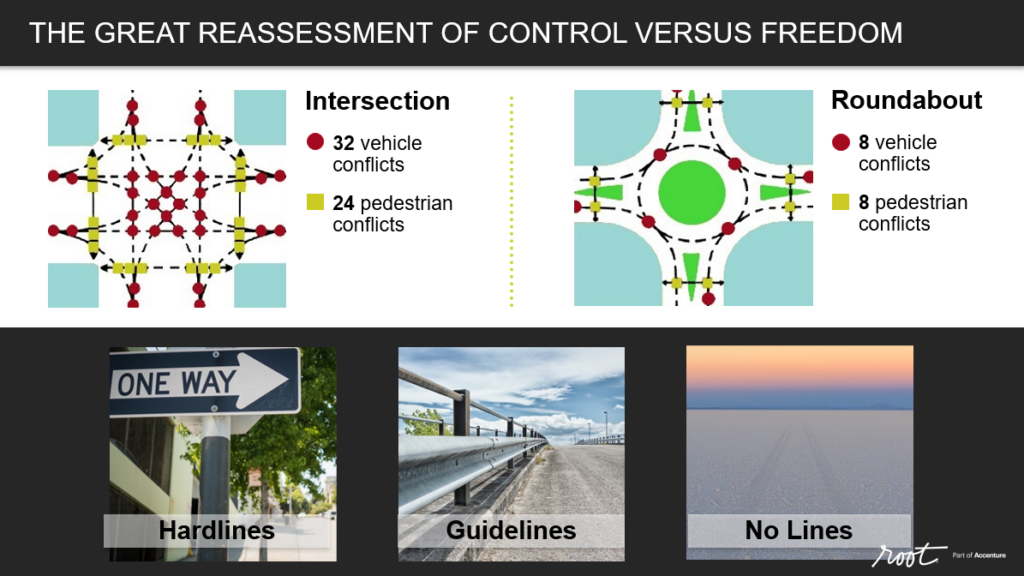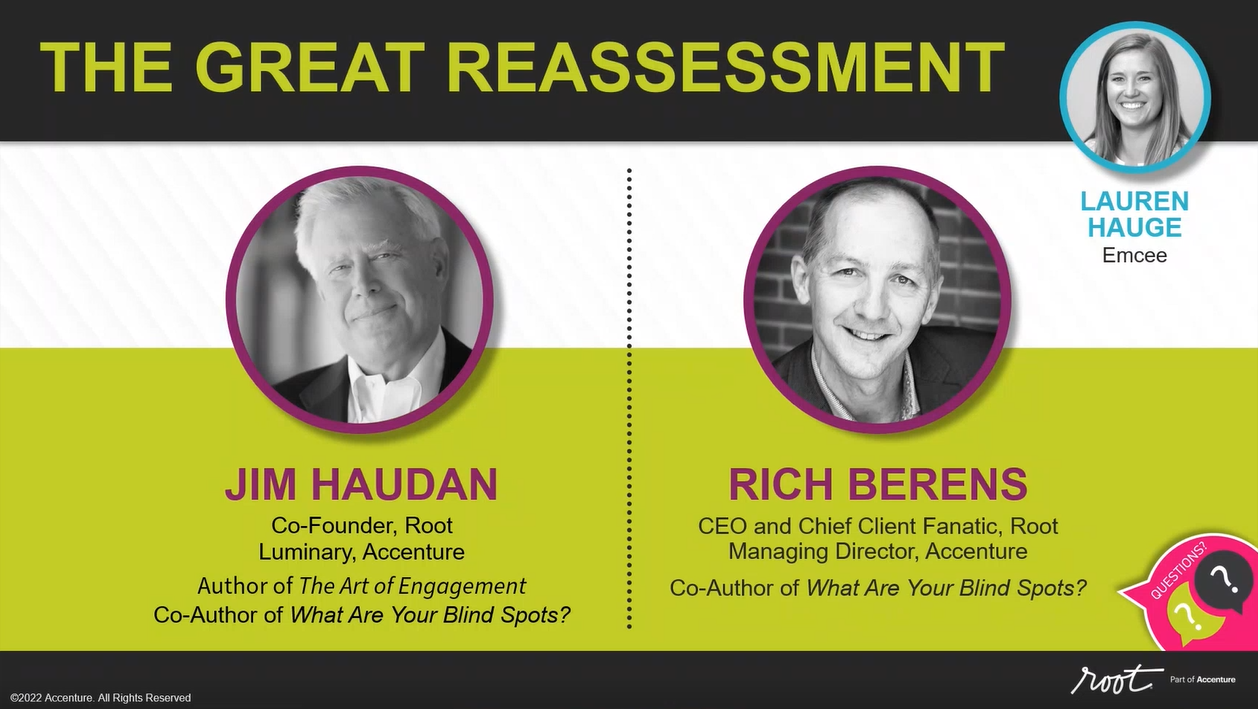When we reflect upon the business world and how it has been impacted since the pandemic began in early 2020, we find that many Fortune 1000 organizations have actually achieved greater success and profitability during this time. At least on paper. When we look under the hood, what we find is quite different.
While organizations have fiscally thrived, their people have not. Instead, employees have been left feeling lonely, disconnected, and more disengaged than ever. As dissatisfaction at work has exploded, so has the urgency for change. Currently, 54% of Americans are reexamining their life priorities – up 20% since the pandemic began.
We’re at a critical point, one in which people are reassessing how they spend their time and who they work for. If leaders want to keep valuable employees on board, they need to shift from focusing on recruitment to becoming an active player in the Great Reassessment.
Tip One: Lead with curiosity and with the intent to ensure people feel valued.
Today only 57% of people feel very valued at work. This is not an impressive number. Leaders need to realize that when employees don’t feel valued, they’ll spend their time trying to validate themselves instead of creating and contributing. But this isn’t the only issue at hand. Additionally, according to data acquired from Root client feedback, 70% of people feel they are using half or less than half of their potential. Together, these two dismal pieces of data tell us that leaders need to make some big changes, and fast.
Leaders must identify why people don’t feel valued and must become deeply curious about what would empower people to contribute more of what they have to offer. How? By asking questions that give people the chance to voice their thoughts without fear of judgment or consequence.
Questions leaders should ask include:
- What needs to happen for you to contribute more of what you have to offer? What can your manager do differently? Your team members?
- What specific things can the leadership team do to help you feel more valued?
Leaders must be curious, ask questions, and actively listen to learn what people need and want from their employers – and then put this information into action.
Tip Two: Create a culture of trust so people are empowered to bring their unique selves to work.
There’s an outdated leadership belief that people will not do the right thing unless you tell them what to do and hold them accountable to it. However, this goes against the human desire to contribute our own perspective and ideas. One way to overcome this dilemma is to leverage the hardlines, guidelines, and no lines framework, which focuses on clearly defining the instances in which there are specific rules to follow and also encourages people to make their own choices when possible.
This concept can be seen in the real world in our intersections and roundabouts. Intersections only have very clearly defined hardlines – stop at red, slow down at yellow, and go at green. There’s no room to make your own choice. But a roundabout is essentially built on trust and self-organization. Believe it or not, roundabouts are safer than intersections, as research finds that roundabouts experience 39% fewer vehicle collisions, 76% fewer injuries, and 90% fewer serious injuries and fatalities. This validates the fact that when given the opportunity, people can be trusted to make good decisions – and more than likely, organizations would also benefit from this roundabout structure. But even when organizations say they want to be more like a roundabout, the de facto mindset is to be like an intersection. Therefore, leaders must be incredibly proactive and consciously lean into trust and self-organization at work.

While roundabouts are a clear winner in the driving world, hardlines, guidelines, and no lines all have their place in the world of work.
For example, in the restaurant business, hardlines must apply to all things relating to food safety, as food safety is non-negotiable. But when it comes to customer service and we consider bringing individuality and unique personalities to the job to do what is best for the customer (within reason), leaders must encourage guidelines and no lines.
Leaders must give people the freedom to show up as their best selves. This makes a huge difference in terms of building trust and can help people feel emotionally invested in their work.
Tip Three: Give power back to your people via job crafting.
If people are deeply unhappy at work, then it’s time to help them redesign their tasks and their connection to the bigger picture. Create the opportunity for them to combine what they do each day with what they are passionate about and what they value. This will create greater fulfillment, bring more enjoyment, and allow the business to have a great impact.
Here’s an example. Researchers once studied job crafting in a hospital and observed a member of the custodial team re-cleaning the room of a patient in a coma. The father of the patient had been by his son’s bedside for three months, and one day he told the cleaner he wasn’t happy with the job she had done. So what did she do? She cleaned the room again. When asked why, she replied that she saw herself as a healer – not only for the patient, but for the family – and if she was able to help give the father some control in an unfathomable scenario, she was happy to do it without question or hesitation.
This story became an example in that hospital and has lived on to influence countless others.
Imagine we all took the time to ask ourselves, “How could I change my daily tasks to get real fulfillment out of my work?”
Leaders have an opportunity – a duty – to remind people that they, too, have a choice in how they approach their jobs. To help them realize they have freedom in their role. They have the ability to create something that is even more important to them. “How do I maximize my own experience by thinking about it differently?” is a powerful question to ask. Leaders must get their people to ask it and then act on it so people can leave the Great Resignation and instead enter the Great Reassessment, a time in which we all successfully connect our daily work to our own greater purpose.









